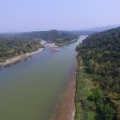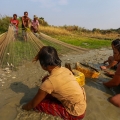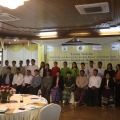Chindwin Futures to co-host 4th stakeholder consultations for improving Chindwin River Basin management in Myanmar, 6-7 October
Chindwin Futures (CF) is continuing its efforts to improve Chindwin River Basin management by co-organising the 4th consultation meeting in Monywa during 6-7 October 2015. SUMERNET partners in Myanmar will be participating.
Through the Chindwin Futures (CF) programme, SEI is continuing its efforts for improved Chindwin River Basin management through in-depth scientific assessment studies and wide-ranging stakeholder consultations in collaboration with Myanmar government agencies, academics, civil society and local representatives.
In recent years, rapid economic development has resulted in many changes to the Chindwin River, the largest tributary of Ayeyarwady River. Water quality has degraded due to more intensive land use, mining and other upstream activities while sedimentation and embankment erosion are increasing. These are causing adverse impacts for local people who depend on the Chindwin basin for water-use for households and livestock, transportation and livelihoods.
The Chindwin River Basin in Myanmar’s Sagiang Region has been a source of life for communities and villages settled along its bank. It flows 1,200 km from the mountainous terrains in the north to the south and is the largest tributary of the Ayeyarwady River. People rely on the river for transportation and use the water for their daily life and agricultural activities.
But these past many years, economic development has brought about rapid degradation of water quality due to changes in land use, mining and other activities in the upstream while sedimentation and embankment erosion have been accumulative. These issues adversely affect local livelihoods.
Khin Ohnmar Htwe, Director of Myanmar Environment Institute (MEI), said there was over an urgent need for the establishment of Chindwin River Basin Organisation (RBO) to improve water use monitoring and river system management to help achieve sustainable development in the near future.
“Chindwin River has encountered water management problems for quite a long while and the threats become even more serious. We need to act now to stop these problems and to improve the living standard of the people,” she said.
The establishment of the Chindwin RBO is now in progress as the Sagiang Region’s Minister of Communication and Transportation, Aung Zaw Oo, also agreed to cooperate with the Chindwin Futures (CF) programme to further conduct scientific assessment studies in the region. As part of this effort, the technical workshop and stakeholder consultation meeting in Monywa will be held during 6 -7 October to further increased collaboration and understanding of the environmental issues facing the Chindwin River.
“It will be an opportunity for government officials and relevant stakeholders to know more about river basin management,” Aung Zaw Oo said.
This will be the fourth meeting for Chindwin Futures Assessment that was implemented in early 2014. The meeting will help pave the way for the establishment of Chindwin RBO as one of the long-term work solutions in the Chindwin Futures program. The meeting will be attended by 80 participants representing government ministries, universities, private sector and local and international NGOs. Key SUMERNET partners from Myanmar will be attending the meeting.
Khin Ohnmar Htwe said that the key issue of local concern is sedimentation and embankment erosion as they pose difficulties for river transportation. Currently, the river is still primarily used to transport goods between upper and lower Myanmar. In recent years, during the dry season the water level is lower than usual in recent years, and causes difficulties for boats to transport goods up and down the river.
Agricultural activities in the region have been forced to a halt during the dry season because the sediments block the already low level of water. Moreover, the low water levels also pose dangers of water scarcity for farming.
“The establishment of the Chindwin RBO is expected to help accelerate the implementation of policies and regulations. Concerned government agencies, national-level organisations and researchers will play an important role in policy implementation while local businesses and communities can share their part in conserving the environment by observing those policies and regulations. The success of Chindwin RBO will contribute in sharing the lessons learnt for the establishment of RBO for other major river basins, including Sittuang, Thanlwin and Kaladan that are being supported by other initiatives,” Khin Ohnmar Htwe said.
MEI has assisted SEI in conducting in-depth interviews regarding the establishment of RBO with 30 organisations in Myanmar to reflect their understanding, awareness and support for the policy making relating to river management. These interviews and results will be presented during the upcoming meeting.
Chayanis Krittasudthacheewa, SEI Asia deputy director, who is leading the Chindwin Futures program in SEI, said that SEI had a very good chance to collaborate closely with MEI, universities, regional government and other concerned stakeholders in Chindwin in the past years. SEI plays a role in supporting technical knowledge, scientific assessment and multi-stakeholder dialogues in Myanmar.
Several examples of RBOs from various countries have already been introduced to the participants in previous stakeholder consultation in May 2015. The findings from household survey, interview and studies conducted over the past few months will be presented to support decision making on exploring the option for Chindwin RBO. The RBO’s mandate varies according to needs and desires in which Myanmar stakeholders will have to identify goals, responsibilities, operational activities, governance and funding of their Chindwin RBO. A series of meetings in the future wil be held to further explore the possibilities and agreements from all concerned parties for improved management of the Chindwin River Basin.
All photos by Lada Phadungkiati, SEI Asia.
Read related story at: http://www.sei-international.org/news-and-media/3186.
Contact for more information: rajesh.daniel@sei-international.org.
Info
This story is part of the following project
Topic
Country
Related people
You might be interested in
-
Short film on "Saving Chindwin's Biodiversity"
“Saving Chindwin’s Biodiversity” gives the perspectives of the people living in the basin who talk about their lives and livelihoods, the threats to the natural resources such as from mining, and their ongoing efforts to urgently protect the basin’s natur
![Short film on "Saving Chindwin's Biodiversity"]()
-
Chindwin Basin biodiversity faces serious threats, urgent conservation measures needed, say SEI’s scientists
SEI scientists say Myanmar’s rapid economic development threatens the Chindwin Basin’s flora and fauna and the local livelihoods dependent on these resources. Implementing a host of conservation measures can save these valuable natural resources.
![Chindwin Basin biodiversity faces serious threats, urgent conservation measures needed, say SEI’s scientists]()
-
Biodiversity mapping and assessment in the Chindwin Basin
SEI organized a biodiversity assessment training workshop on 15-16 August 2018. The participants included government organizations, academics and civil society. The aim of the workshop was to build the capacity of participants using tools such as QGIS and
![Biodiversity mapping and assessment in the Chindwin Basin]()
 By
By 



 Read more about SUMERNET
Read more about SUMERNET
